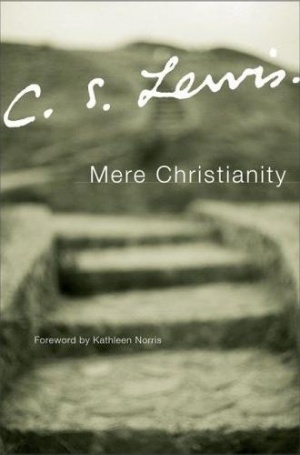Mere Christianity (book)
|
A man who was merely a man and said the sort of things Jesus said would not be a great moral teacher. He would either be a lunatic - on the level with a man who says he is a poached egg - or he would be the devil of hell. You must take your choice. Either this was, and is, the Son of God, or else a madman or something worse. You can shut Him up for a fool or you can fall at His feet and call Him Lord and God. But let us not come with any patronizing nonsense about His being a great human teacher. He has not left that open to us. (An extract from Mere Christianity).
|
| Mere Christianity | |
| RELATED TOPICS | |
| SERMONS, ESSAYS AND OPINIONS |
|
| CONTENTS | |
Mere Christianity is a well known book by C.S. Lewis that discusses some of the major fundamental teachings of Christianity.
Mere Christianity was adapted from a 1943 series of BBC radio chats broadcast while Lewis was an Oxford don during World War II. The transcripts of the broadcasts, expanded into book form, originally appeared in print as three separate pamphlets, "The Case for Christianity", "Christian Behavior", and "Beyond Personality."
The title, Mere Christianity, indicates the intention of Lewis, an Anglican, to describe the Christian common-ground. He aims at avoiding controversies to explain those things that have defined Christianity in nearly all places and times. Lewis restates the fundamental teachings of the Christianity, for the sake of those basically educated as well as the intellectuals of his generation, for whom the jargon of formal Christian theology did not retain its intended meaning.
Of course, the book has not been received entirely without controversy. For example, the chronicle of Lewis's conversion from atheism contains some of the author's reasons for believing which, as may be expected, some have found to be compelling while others have found unconvincing. Lewis famously argues:
- A man who was merely a man and said the sort of things Jesus said would not be a great moral teacher. He would either be a lunatic - on the level with a man who says he is a poached egg - or he would be the devil of hell. You must take your choice. Either this was, and is, the Son of God, or else a madman or something worse. You can shut Him up for a fool or you can fall at His feet and call Him Lord and God. But let us not come with any patronizing nonsense about His being a great human teacher. He has not left that open to us.
This argument and its variations are referred to as the "Trilemma," though Lewis himself didn't use that name. Critics answer that in this case, the form of argument is misapplied resulting in a false dilemma, which avoids consideration of reasonable alternatives.
Further, both Christian and non-religious critics have suggested that Lewis created common ground out of beliefs and sentiments that can only be made to appear similar by being purposely vague. In fact, he makes explicit his use of purposeful vagueness at the beginning of the book, when he describes the common ground of all religions, with his point being that Christianity is not mathematics, even if like mathematicians, Christians may claim that there is only one right answer.
The last third of the book breaks from attempts to logically address issues of belief and instead starts to explore the ethics resulting from belief. This is an interesting part of the book especially for readers who have not yet formally explored ethics.
Mere Christianity is widely admired and influential across a spectrum of Christians, which may attest to the author's success in accomplishing the aim of restating theology in a way that avoids many controversies.
Quotes
Links
Return to Chrisitan literature
Note to users: The wiki is currently operating in safe mode. Editing is limited to users with certain privileges in order to deal with spam. You can create a new user account, and confirm your email ID in order to obtain ability to edit pages. Learn how to be an editor or sysop at WikiChristian.
- Sister projects: WikiMD.com Wellness Encyclopedia & Directory
- Sponsors: WikiChristian is supported by W8MD's medical weight loss and sleep centers.

